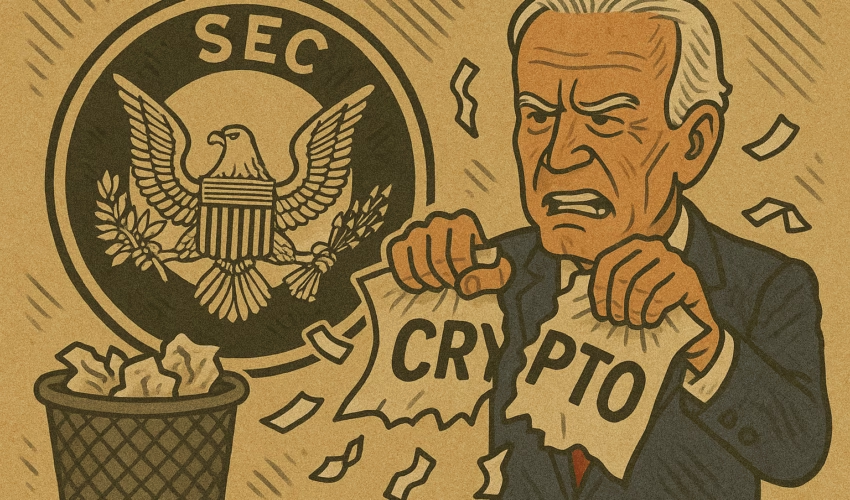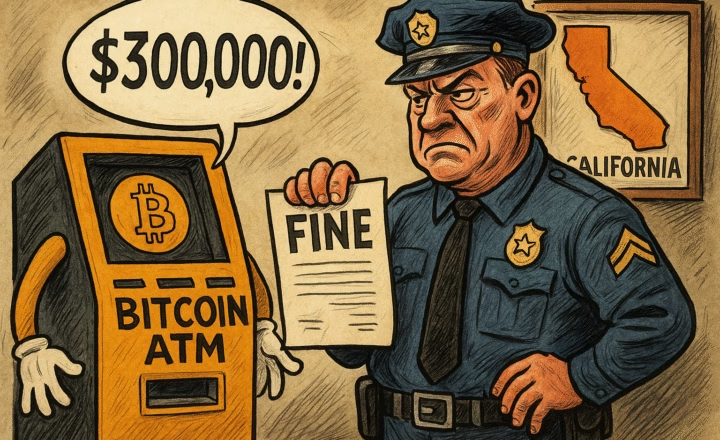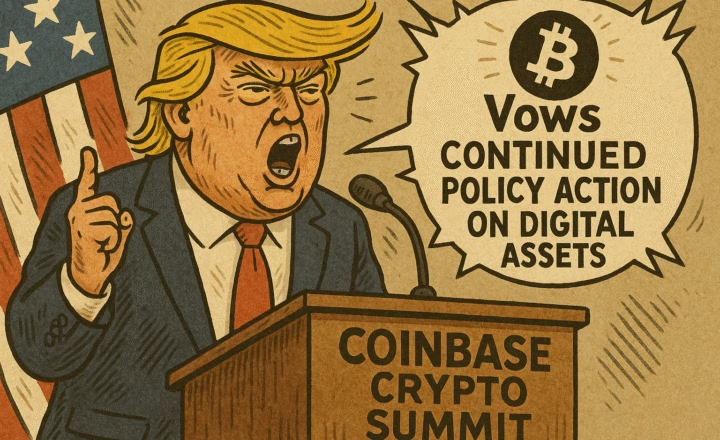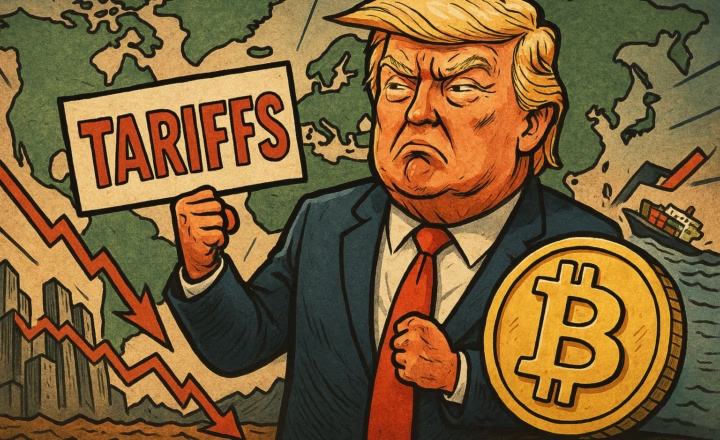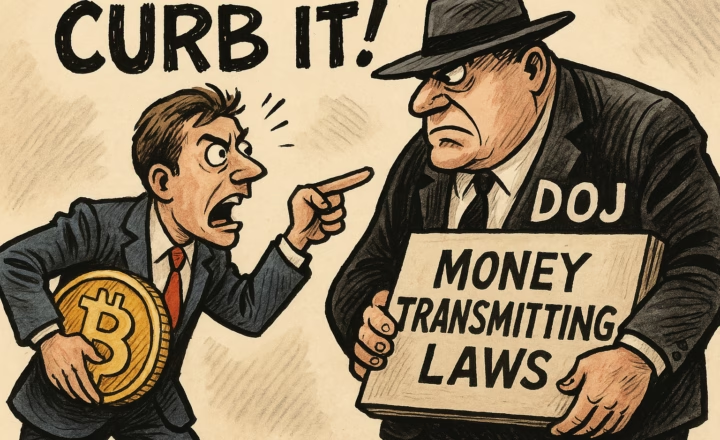Rule Changes on DeFi and Digital Asset Custody Among 14 Withdrawn Regulations
The U.S. Securities and Exchange Commission (SEC) has rescinded a slate of proposed rules introduced during the Biden administration, including two major measures targeting cryptocurrency custody and decentralized finance (DeFi). The withdrawal marks the latest regulatory rollback under President Donald Trump, who has pledged to ease restrictions on both crypto and traditional markets.
The agency announced on Thursday that it was formally withdrawing 14 proposed rules issued between March 2022 and November 2023 during the tenure of former SEC Chair Gary Gensler.
“Down goes 3b-16, qualified custodian, and all the other unfinished Gensler rule proposals,” wrote Paul Grewal, Chief Legal Officer at Coinbase, in a post on X.
Down goes 3b16, qualified custodian, and all the other unfinished Gensler rule proposals. @secgov just issued final notices rescinding them all.
— paulgrewal.eth (@iampaulgrewal) June 12, 2025
SEC: No Plans to Finalize or Reissue the Rules
In its official statement, the SEC said it “does not intend to issue final rules with respect to these proposals” and that it would need to propose new versions if it seeks to revisit these areas in future regulatory actions.
The move aligns with the Trump administration’s broader deregulatory agenda, particularly toward digital assets and emerging fintech sectors.
Key Crypto Rules Withdrawn
Among the most significant proposals rescinded were:
1. Rule 3b-16: Expanded Exchange Definition
Originally proposed in March 2022, Rule 3b-16 aimed to expand the definition of “exchange” under the Exchange Act. The amendment sought to include DeFi protocols and other communication systems that facilitate trading activity.
The rule stated that platforms offering non-firm trading interest or enabling communications between buyers and sellers of securities could be classified as exchanges. Critics argued that such broad language would pull many DeFi platforms into SEC jurisdiction, even if they lacked centralized control.
SEC Commissioner Mark Uyeda, now acting chair, had previously called for the abandonment of the rule, saying it would unfairly burden DeFi innovators and alternative trading platforms.
2. Crypto Custody Rule: Safeguarding Client Assets
The SEC also scrapped a proposed rule issued in March 2023 that would have revised the Custody Rules under the Investment Advisers Act of 1940.
The proposal, known as the Safeguarding Advisory Client Assets Rule, would have required investment advisers to custody all client assets — including crypto — with a qualified custodian, typically meaning a regulated bank or broker-dealer.
This rule posed significant challenges for the crypto industry, as most crypto exchanges and wallet providers do not meet the SEC’s definition of “qualified custodians.” If enforced, the rule could have forced many firms to exit the space or overhaul infrastructure.
In March, Uyeda had asked SEC staff to consider withdrawing the proposal, signaling a shift in regulatory direction.
Other Withdrawn Rules Impacting Crypto and Finance
Additional rescinded rules include:
-
Cybersecurity risk management and reporting requirements for investment advisers and funds — potentially burdensome for crypto fund managers and digital asset custodians
-
Position reporting rules for large security-based swaps, which could have impacted entities with significant crypto derivatives exposure
-
Enhanced ESG (environmental, social, governance) disclosure requirements for public companies — a contentious proposal that faced pushback from industry and conservative lawmakers
These withdrawals are expected to ease compliance burdens for crypto-native firms, fintech startups, and institutional investors involved in digital assets.
Industry Applauds, Critics Sound Alarm
The SEC’s decision drew praise from segments of the crypto industry, which has long argued that the agency’s proposed rules were overreaching, unclear, and hostile to innovation.
“This is a win for innovation and a signal that Washington is finally listening to what the crypto industry has been saying for years,” said one digital asset policy advisor.
However, some critics warned that removing oversight proposals without offering clear alternatives could create regulatory gaps and expose investors to greater risks.
“We still need thoughtful, modern rules to govern digital assets. The answer isn’t to eliminate oversight, but to do it better,” said a former SEC attorney.
Background: Gensler’s Regulatory Push
Former SEC Chair Gary Gensler pursued a broad and often controversial regulatory agenda aimed at bringing crypto markets under traditional financial frameworks. His tenure saw numerous proposals seeking to classify tokens as securities, enforce custody standards, and apply market structure rules to decentralized protocols.
Many of those proposals faced opposition from industry groups, Republican lawmakers, and some SEC commissioners, who viewed the approach as overly aggressive and legally tenuous.
The withdrawal of these proposals marks a clear break from Gensler-era policymaking, signaling a more lenient regulatory environment under current leadership.
What Comes Next?
While the SEC has pulled back these proposals, agency officials indicated that new crypto-related rulemaking could emerge in the future — albeit with fresh language and possibly different regulatory objectives.
For now, the focus will likely shift to legislative efforts in Congress, where bills like the CLARITY Act and the GENIUS Act are under consideration to provide a statutory framework for digital assets, including payment stablecoins and market structure guidelines.
Conclusion
The SEC’s decision to rescind key crypto-related proposals introduced under the Biden administration represents a significant shift in regulatory posture, particularly toward DeFi and digital asset custody. While welcomed by many in the crypto space as a relief from regulatory overreach, the absence of finalized rules leaves a vacuum in clarity that Congress may now be expected to fill.
With crypto markets maturing and institutional adoption accelerating, all eyes are on Washington to deliver a cohesive and balanced regulatory framework — one that protects investors without stifling innovation.

